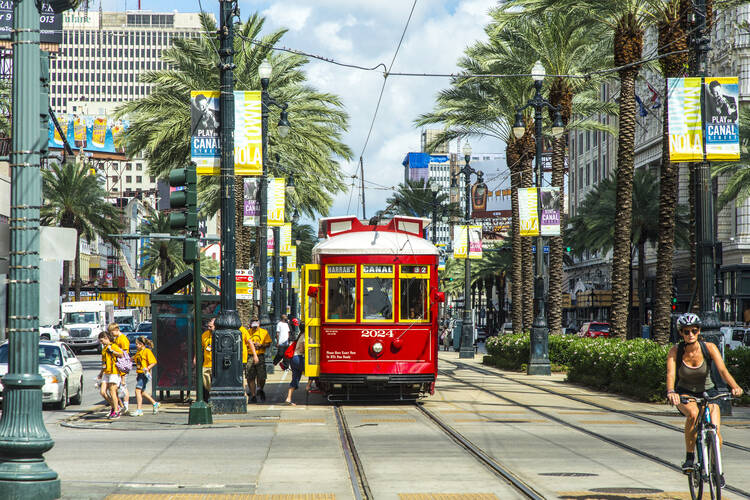The first presidential primary in 2008 should have been in Louisiana. How to rebuild New Orleans after Hurricane Katrina would have been a perfect problem-solving exercise for the candidates. (Or whether to rebuild. Maybe a candidate could have broken out of the pack and won the northern part of the state by arguing that global warming is going to wipe out the city anyway.) By this reasoning, the first contest in 2016 should be in Missouri or Maryland, where violent incidents involving the police and black citizens have exposed the persistence of racial segregation in America. Make the candidates campaign in Ferguson, where they can’t be distracted by butter sculptures and pork chops on sticks.
Or, if you want a more quantifiable criterion, the first two contests should be in rural, almost-all-white West Virginia and the urban, mostly nonwhite District of Columbia, which have the nation’s highest unemployment rates. Instead, the nomination season will begin with Iowa, which has the fourth-lowest unemployment rate, and New Hampshire, which has the fifth-lowest rate. Neither state is known for urban unrest, or for natural calamities like droughts or hurricanes, so candidates can spend most of their time at state fairs and pancake breakfasts assuring older voters that their taxes won’t go up and their Social Security checks won’t go down.
Donald Trump has taken the lead among Republican voters in both states by promising that America can be great again if it emulates feudal Japan, before the arrival of Commodore Perry’s black ships, and seals itself off from the rest of the world. Trump’s plan to deport 12 million undocumented immigrants and deny citizenship to their children born in the U.S. would, at least, wreak economic havoc on the Northeastern Corridor and older cities like Chicago, which depend on newcomers to replace the Americans who move to warmer states. If you want to bring New York City down a couple of pegs, the builder of Trump Tower on Fifth Avenue is apparently your candidate.
Trump’s proposal to build a wall between the U.S. and Mexico, and somehow force Mexico to pay for it, is being hailed as a common-sense masterstroke—a way to give America back to real Americans—by Republican voters from Sioux City, Iowa, to New London, New Hampshire. And we’ve already used boundaries and physical barriers to try to impose order in America. The poverty, underfunded schools and antagonisms between police and civilians in places like Ferguson was exacerbated (quarantined?) by the redrawing of municipal lines to separate mostly black neighborhoods from more upscale white suburbs. The TV miniseries “Show Me a Hero,” currently airing on HBO, depicts how the city of Yonkers, N.Y., fought to preserve the Saw Mill Parkway as a barrier to keep low-income housing from being built in the “nice” part of town.
When Katrina hit New Orleans a decade ago and the levees failed, poorer black neighborhoods got the worst of the flooding, and some residents trying to escape came up against a literal barrier to the suburbs. From a contemporary report in The New York Times: “Police agencies to the south of New Orleans were so fearful of the crowds trying to leave the city after Hurricane Katrina that they sealed a crucial bridge over the Mississippi River and turned back hundreds of desperate evacuees, two paramedics who were in the crowd said.” It was a perfect Trumpian solution: simple and defiant, with no concession to a common good or recognition that, as Pope Francis said in another context, “Everything is connected.”
Ten years after Katrina, the city of New Orleans has regained a look of normalcy. As Dante Ramos writes in the Boston Globe, efforts to rebuild the city attracted “an influx of money and brainpower.” But in some ways the city feels more disconnected than before: “The recovery didn’t reverse the old disparities; in some ways, it reinforced them.” For example, “Homeowners got repair grants that reflected the pre-Katrina value of their homes—hobbling those who owned inexpensive homes but faced stiff renovation costs.” The city’s more fashionable sections are prospering, as in many major American cities (some of the new residents “don’t like loud jazz music in the streets”), but the child poverty rate in New Orleans overall is back to an alarming 39 percent.
The Atlantic’s Eric Jaffe reports that public transit in New Orleans has also had a two-track recovery, with tourist-friendly streetcars back to normal but buses running at 35 percent of the pre-Katrina level of service. Bus riders are losers, to use a favorite word of Trump’s, in the New Orleans comeback.
This week Republican candidates Scott Walker and Marco Rubio have tried to steal some of the spotlight from Trump, not by criticizing his ideas on immigration but by promising to end the scourge of affordable health insurance. New Orleans will have to make the most of the Katrina anniversary; since its problems don’t lend themselves to yet another wall, the city is not likely to get much attention from Trump and company.








